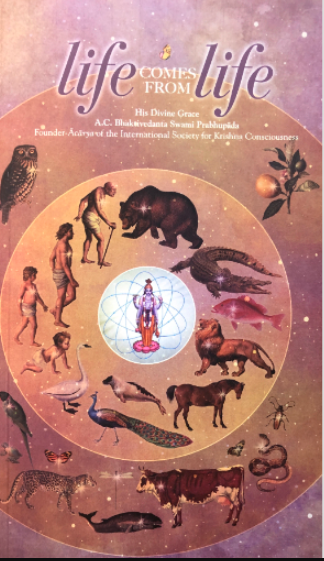Life Comes From Life
₹100.00
Description
Life Comes From Life:
Table of Contents of Life Comes From Life:
-
-
-
-
Life Comes From Life Foreword
The First Morning Walk: April 18, 1973
The Second Morning Walk: April 19, 1973
The Third Morning Walk: April 28, 1973
The Fourth Morning Walk: April, 29, 1973
The Fifth Morning Walk: May 3, 1973
The Sixth Morning Walk: May 7, 1973
The Seventh Morning Walk: May 8, 1973
The Eighth Morning Walk: May 11, 1973
The Ninth Morning Walk: May 13, 1973
The Tenth Morning Walk: May 14, 1973
The Eleventh Morning Walk: May 15, 1973
The Twelfth Morning Walk: May 17, 1973
The Thirteenth Morning Walk: December 2, 1973
The Fourteenth Morning Walk: December 3, 1973
The Fifteenth Morning Walk: December 7, 1973
The Sixteenth Morning Walk: December 10, 1973
-
-
-
This book is based on taped morning-walk conversations that Śrīla Prabhupāda had with some of his disciples during 1973, in the Los Angeles area. On those mornings when he focused on science, Śrīla Prabhupāda spoke mainly with his disciple Thoudam D. Singh, Ph.D. An organic chemist, Dr. Singh presently directs the Bhaktivedanta Institute, an international center for advanced study and research in science, philosophy and theology.
Each day, wherever in the world he happened to be, Śrīla Prabhupāda would go out for a lengthy stroll in the chill quietude of the early morning, and cloaked in a warm wrap, he would share intimate moments with a small group of students, disciples and special guests. Some mornings found him immersed in contemplation or quiet appreciation of the surroundings, and little dialogue emerged. At other times he spoke at great length, and often with considerable intensity, on various subjects. During these animated discourses he demonstrated that philosophical analysis need not be a dull, abstruse affair, but can be a dynamic cutting edge into every sphere of life. Nothing could escape his keen intellect, deep spiritual insight and uncommon wit. Rejecting superficial and dogmatic thinking, he edified, challenged, cajoled, charmed and enlightened his students, and he carefully guided them to increased insight and understanding.
Śrīla Prabhupāda (1896–1977) is an internationally recognized author, scholar and spiritual preceptor, and he is widely esteemed as India’s greatest cultural ambassador to the world. In Life Comes From Life, Śrīla Prabhupāda takes the role of philosopher-social critic. With philosophical rigor, profound common sense and disarming frankness, he exposes not only modern science’s methodological shortcomings and unexamined biases but also the unverified (and unverifiable) speculations that scientists present to the trusting public as known fact. Thus Śrīla Prabhupāda breaks the spell of the materialistic and nihilistic myths which, masquerading as science, have so bewitched modern civilization.
Once upon a time (as in a fairy tale), most of us believed that the food we ate was basically wholesome, nutritious and free from dangerous chemicals, that advertising may have been believable, and that product labels truly described the qualities and contents of what we fed ourselves and our families. Once upon a time, most of the world believed in the integrity of our heads of state, high-ranking political officials and local leaders. Once upon a time, we thought our children were getting a solid education in the public school system. Once upon a time, many of us believed atomic energy had “peacetime uses” that were perfectly safe and completely congruous with a happy and healthy society.
Yet in recent times our illusions have been shattered. Repeated exposes of widespread consumer fraud and grand political collusion and bribery have all but destroyed our former innocence. We now know that through mass marketing and the media, a veil of fantasy and deception can be created with such unprecedented expertise that it can become impossible for us to distinguish between substance and simulation, reality and illusion.
Today many scientists are propagating the doctrine that life originates from matter. However, they cannot provide proof, either experimentally or theoretically. In fact, they hold their stance essentially on faith, in the face of all sorts of scientific objections. Śrīla Prabhupāda points out that this groundless dogma has done great damage to moral and spiritual standards worldwide and has thus caused incalculable suffering.
Though beset by internal doubt and division, modern scientists have somehow managed to present a united front to the nonscientific public. Their behavior brings to mind the worst in political and corporate trickery. For instance, despite the recent outcry over their masking the difficulties of maintaining safety standards at nuclear power plants, the scientists and the government remain committed to nuclear power and even make light of the fact that there is no safe way of dealing with radioactive waste.
As we can see, on the one hand many scientists have a deep personal commitment to the concept that life comes from matter. On the other hand they admit that they do not have the evidence to corroborate their conviction, and that their theory is beset with intractable problems. They are convinced that life arose from matter and is reducible to matter, yet at the same time they must confess to having scant scientific grounds for their conviction. Thus their theory is a priori: it supersedes the scientific method and science itself. Their fervent, almost messianic hope is that someday, somehow, someone may be able to validate it, and in the meantime their faith is unshakable.
Dazzling technological achievements have given modern scientists an aura of infallibility, and so when the scientists present untested or unprovable theories about life’s origin, people tend to accept with blind faith. In Passages About Earth William Irwin Thompson writes, “Just as once there was no appeal from the power of the churches without risking damnation, so now there is no appeal from the power of science without risking a charge of irrationality or insanity.” And as botanist Garrett Hardin notes, anyone who questions the status of Darwin “inevitably attracts the speculative psychiatric eye to himself.”
The dialogues in Life Comes From Life may seem revolutionary, but then were not Newton, Pasteur and Einstein scientific revolutionaries? Life Comes From Life does not simply criticize those who support the theory that matter is the origin of life. Rather, this book encourages them to rededicate themselves to a more genuine and intense quest for truth and knowledge, and to thereby redirect their valuable intelligence, resources and work toward the true benefit of the world.
If you have any doubts in the quest of spiritual progress, please ask our experts at 9738769587 or 9740603910 or email at contactus@divyamayayoga.com
Additional information
| Weight | .080 kg |
|---|---|
| Dimensions | 15 × 10 × 1 cm |
You must be logged in to post a review.







Reviews
There are no reviews yet.